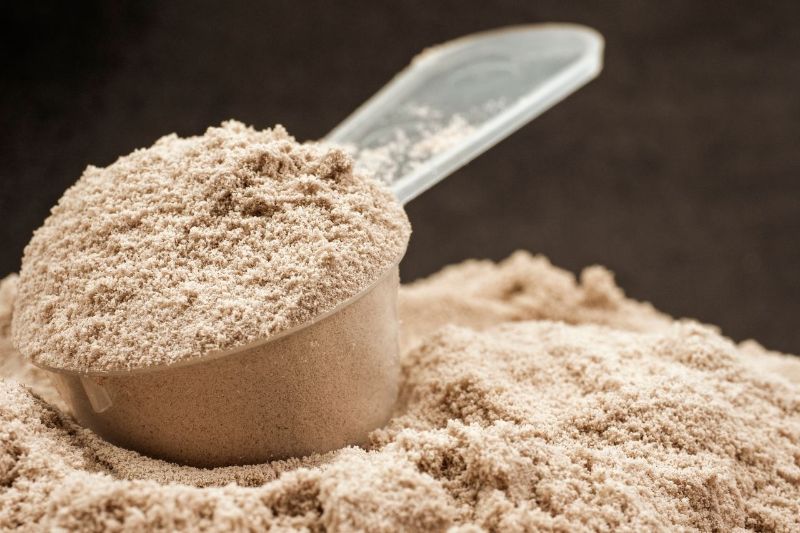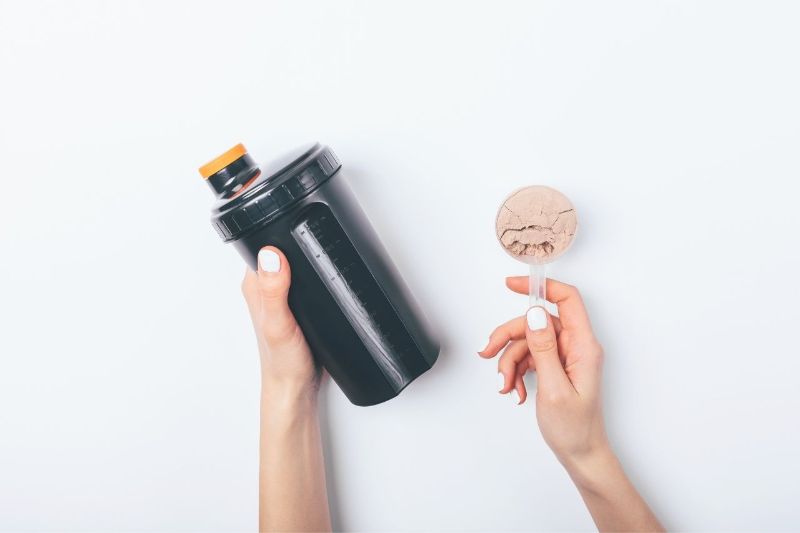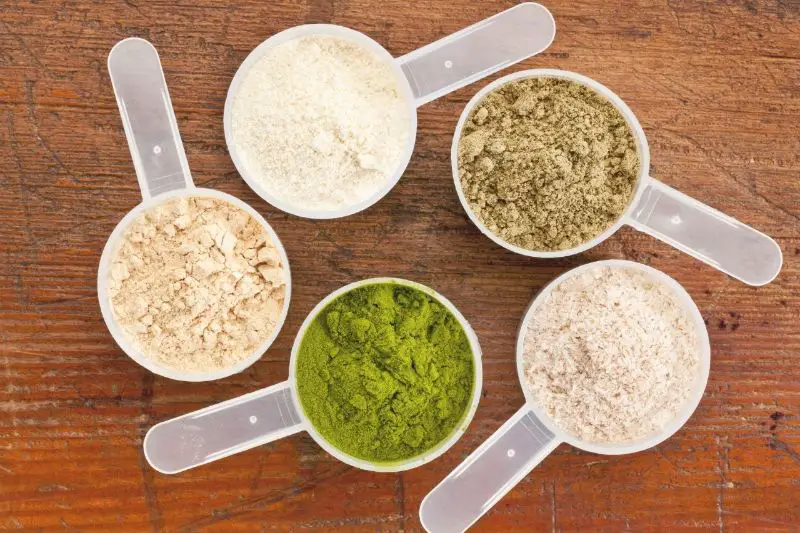This post may contain affiliate links. For more info, please read our full disclosure here
If you’re someone who’s looking to add more a bit more protein into your diet, then odds are, you’ve probably heard about protein powders.
They are believed to be one of the easiest and most convenient ways to boost your daily protein intake.
Whether you’re looking to lose weight, bulk up (build muscle), or just want to eat healthier, getting enough protein can, and does play an important role.
If you’re wondering how protein powders work, and which ones to choose, then you’re in the right place.
In this post, we’ll discuss exactly what protein powders are, their benefits and risks, the different types, and also how to choose the best protein powders for your goals.
Let’s get right into it.
What Are Protein Powders

Proteins are one of the essential building blocks of life as we know it. It is also one of the 3 important macronutrients your body needs to survive (besides fats and carbohydrates).
This essential macronutrient does a whole lot of stuff in the body. From building and repairing muscles, to creating enzymes, boosting the immune system, transporting nutrients, and lots more. [1]
For some people, getting enough of this much needed protein is an issue. This may happen for a number of reasons.
Regardless, protein powders are an easy and extremely convenient way to get this much needed protein.
They are basically created by isolating the protein-rich part of certain foods. This isolated protein-rich component is then processed into the powdery form you’re familiar with [2].
Depending on the type, the protein powder may also be enriched with other nutrients, as well as ingredients to help improve its taste.
Benefits Of Protein Powders

There are lots of upsides when it comes to incorporating protein powders into your daily meals. Some of which include;
1) Easy and Convenient
Like I said earlier, some people may find it a bit more difficult to hit their daily protein requirements. This may be due to factors like dietary preferences, lack of food flexibility, a tight schedule and so on.
For example, vegans and vegetarians need to exclude animal products like meat, fish, eggs etc. from their plates.
While there are still lots of natural plant-based protein sources to enjoy, protein powders offer a pretty convenient way to get the required protein, without stress.
They’re also a pretty quick and easy option, especially for busy people who can’t exactly afford to spend hours in the kitchen each day.
2) Helps Muscle Growth And Recovery
There’s a reason why protein shakes/smoothies are popular among the bodybuilders and weight-lifters. Protein aids muscle growth and recovery.
In addition to being pretty convenient, protein powders can help provide you with the required protein your body needs to speed up muscle recovery after a workout.
It doesn’t matter if you’re consuming it before or after your workout [3]. As long as your body gets the amount it needs to get the job done, you’re good to go.
3) Can Aid Weight Loss
This isn’t directly related to protein powders per se, but proper protein consumption in general.
Studies have shown that protein is actually the most satiating macronutrient [4]. Meaning it’ll help keep you fuller for longer.
In addition to this, it helps to boost metabolism, among other things. These factors usually play an important role when it comes to eating healthier, and potentially losing weight.
Many other benefits associated with proper protein intake can be enjoyed by incorporating protein powders into your meals.
Different Types Of Protein Powders

You may or may not have realized this by now, but now all protein powders are created equal. They differ primarily based on the source they’re gotten from, as well as their concentration or level of processing.
In terms of concentration, there are 3 main types. Concentrates, isolates and hydrolysates.
- Concentrates – These are the most common ones you’re likely to see every day. They basically contain about 70% protein, while the remaining 30% is made up of fats and carbs.
- Isolates – These ones have a much higher protein content, coming up at about 90% or more, while the rest is left to carbs and fats.
- Hydrolysates – These ones go through some more extra processing to make them much easier and faster to be absorbed by the body.
In terms of the sources they are derived from, there are several different types of protein powders. Some of the more popular ones include;
1) Whey Protein
This is one of the most common types of protein powders you’re likely to run into. It’s made from whey, which is one of the byproducts gotten during the production of cheese from milk [5].
Whey protein contains all 9 of the essential amino acids your body requires, making it a complete protein source. It can be great for body building, and can also help with weight loss too.
Plus, it’s also absorbed more quickly by the body, compared to many other types of protein powder.
Whey protein may also offer a couple more benefits, such as reducing blood pressure, helping to fight inflammation, easing IBS, and more. [6]
Since it’s gotten primarily from milk, whey protein contains some amount of lactose, although it seems to be very minimal, and even almost non-existent in certain types [7].
2) Casein Protein
Casein is another protein found in milk. In fact, it makes up about 80% of the protein in milk, while whey makes up about 20%.
Similar to whey, casein also contains all 9 of the essential amino acids your body requires, making it a good source of protein.
Compared to whey, casein is digested and absorbed more slowly. This isn’t necessarily a bad thing, as it can help keep you satiated for much longer, and help reduce cravings [8].
It’s also very effective for muscle building and post-workout recovery.
3) Egg Protein
Eggs are another amazing high-protein food you can enjoy. It’s certainly no surprise that they’d make a great candidate for protein powders.
Egg protein powders are made primarily from egg whites, since they are cholesterol free, lower in calories, and contain most of the protein in the egg.
They also contain all 9 essential amino acids, making them an excellent protein source. Plus they can serve as a great option for people who can’t tolerate the dairy found in whey or casein [9].
While some studies show they might not be as satiating as casein [10], they can still be a great source of protein in your meals, and could also possibly help reduce mental fatigue [11], and improve muscle mass [12].
4) Pea Protein
While animal products like milk and eggs seem to be a popular parent to protein powders, they’re not the only ones out there. There are lots of amazing plant-based sources as well.
This is great news, especially for people on plant-based diets, such as vegetarians and vegans, and also people who can’t tolerate dairy products or eggs.
Pea protein is made from split peas. And unlike many other plant-based sources, they actually contain all the 9 essential amino acids [13].
Although peas seem to be low in one of the essentials (methionine), this can easily be supplemented with methionine-rich foods, like meat, tuna, tofu, Brazil nuts, and so on [14].
PPP is also pretty satiating, even when compared to other animal-based proteins like whey and casein [15]. And they’re great for building muscle mass too, among other things [16].
5) Soy Protein
When it comes to plant-based sources of protein, it’s hard to ignore the usefulness of soybeans. After all, they’re the parent food behind popular high-protein options like tofu, tempeh, edamame and so on.
Being from the same source, soy protein powder can also serve as a great way to supplement your protein needs, and even offers a couple of interesting health benefits as well [17].
For starters, soybeans contain all the 9 essential amino acids your body requires [18]. It’s one of the few plant-based sources that contain all essential amino acids. Plus, they’re also cholesterol-free, and low in fats.
When compared to other protein powders, like whey, SPP has been shown to yield similar or close results in most cases, especially when their leucine (an important amino-acid that affects muscle synthesis) contents are matched [19, 20, 21].
SPP can be a great option for people who are on meatless or plant-based diets, such as vegetarians and vegans. And like any other protein powder, it’s pretty easy to incorporate into your diet as well.